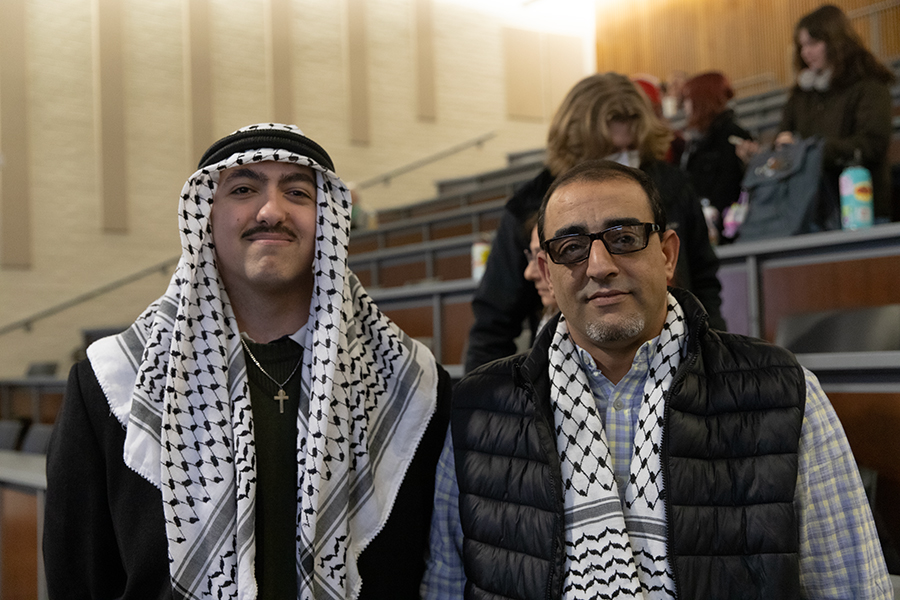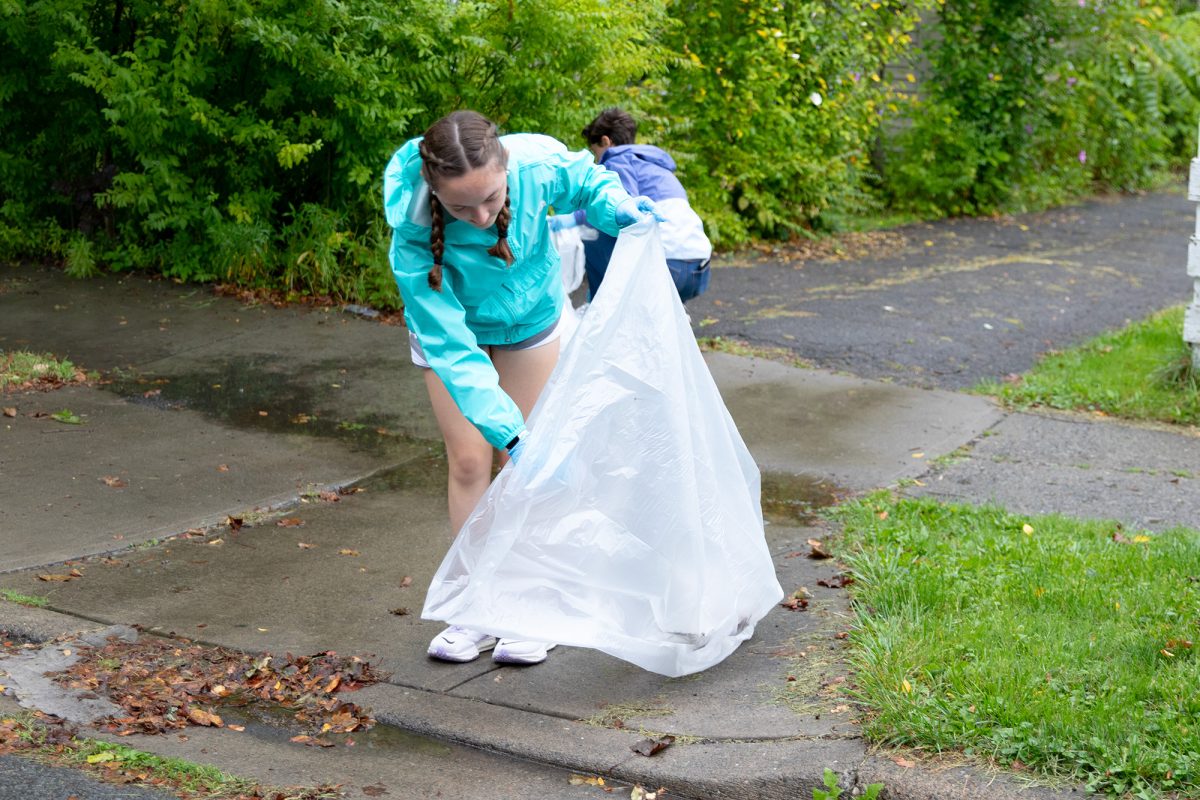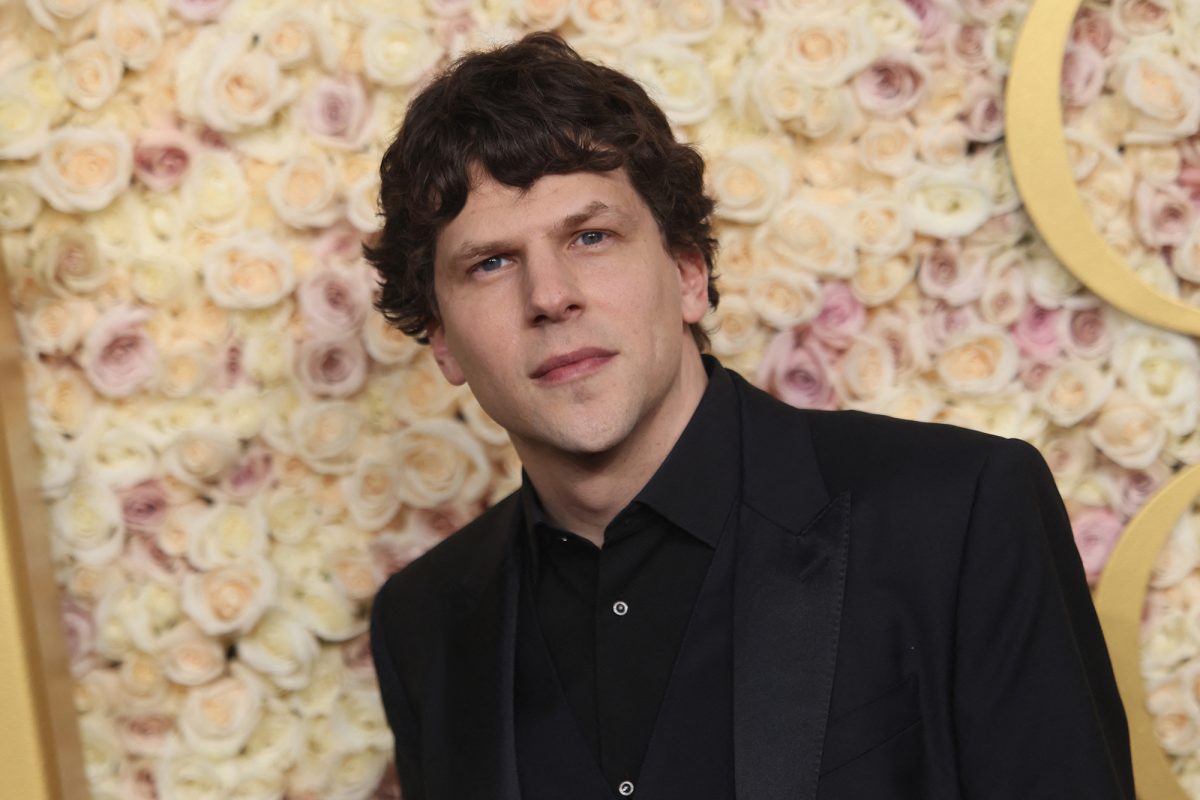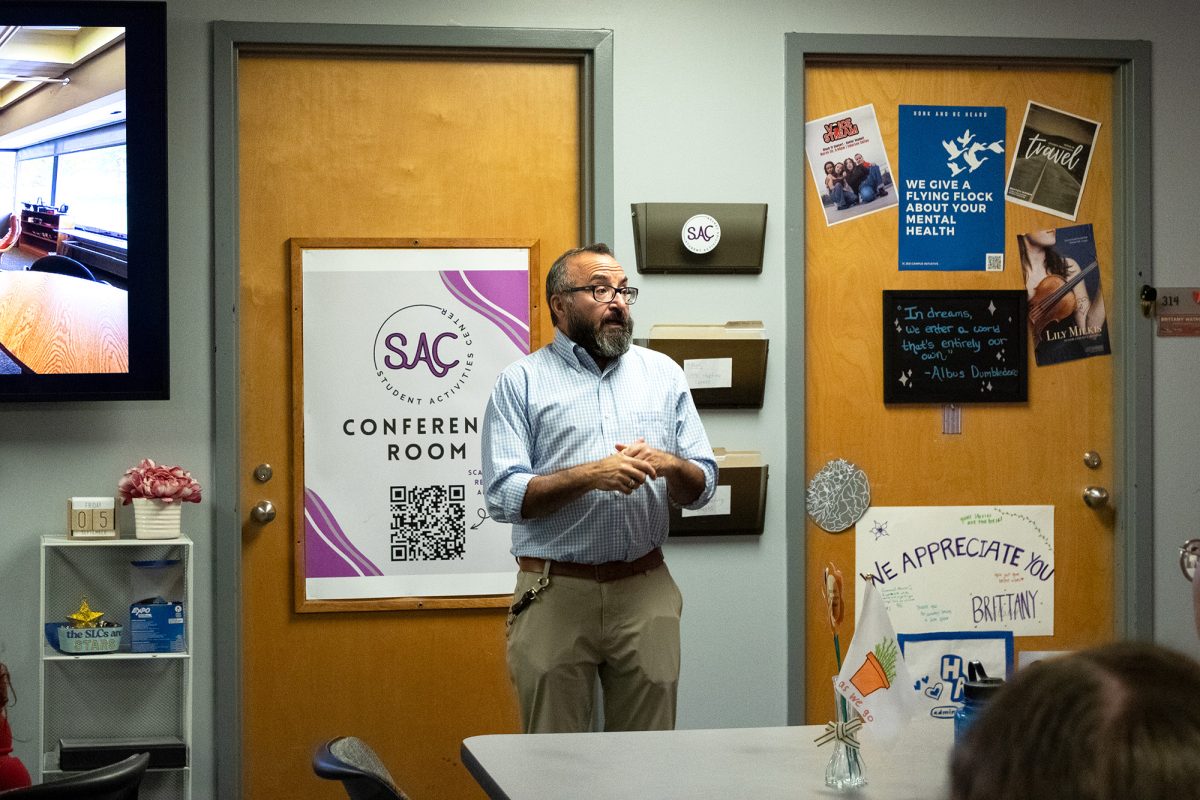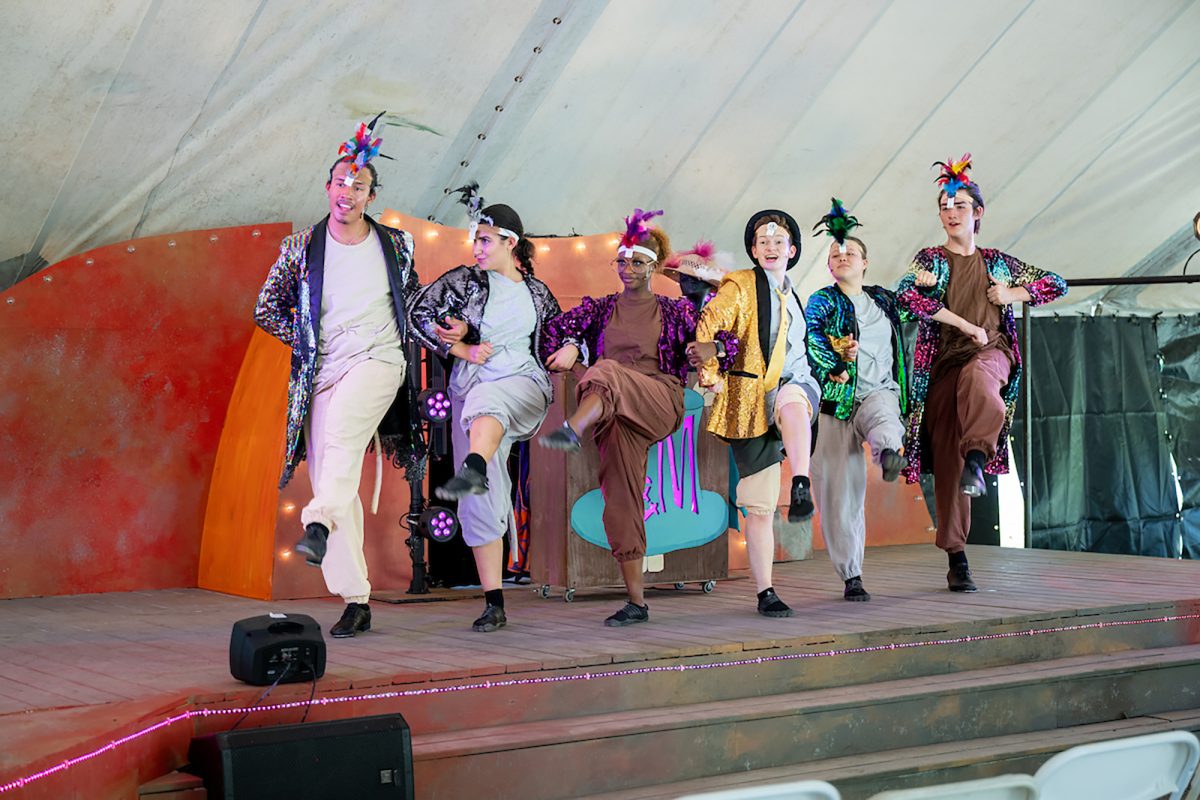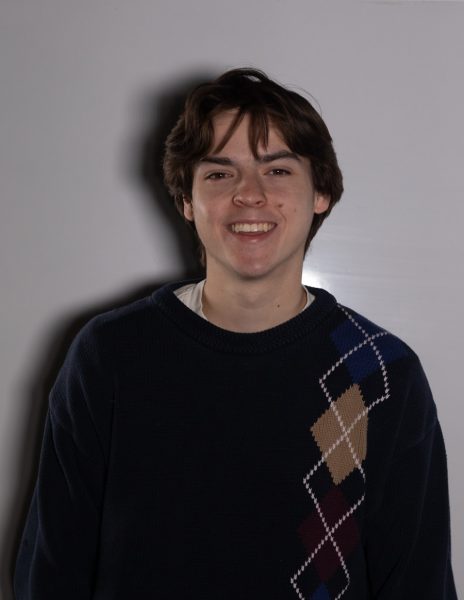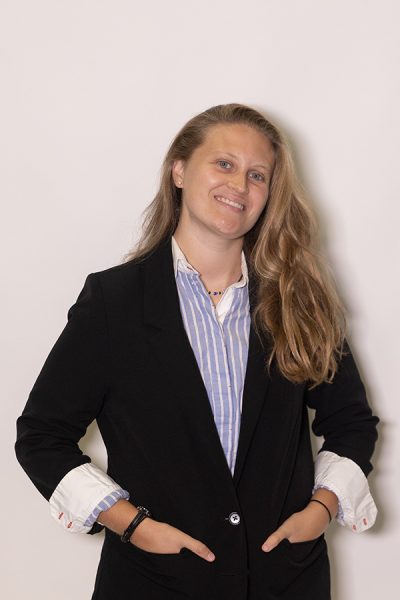Ithaca College Students for Justice in Palestine (ICSJP) held a panel discussing the impacts of Palestine, the Israel-Hamas war and Zionism at Ithaca College and the wider Ithaca community. The Feb. 18 panel was attended by about 35 students, faculty, staff and community members.
The panel was an alternate “Side-by-Side” event, a response to Hillel’s annual event that brings an Israeli speaker together with a Palestinian speaker about the ongoing Israel-Hamas war. Some students boycotted the “Side-by-Side” event with a peaceful gathering outside of Textor Hall on Feb. 6. The original event was boycotted after Ithaca College Students For Palestine (ICSFP) posted tweets that the Israeli speaker had retweeted, saying they thought Uriel Abulof was downplaying the conditions and conflict in Gaza.
Since the original “Side-by-Side” event, the Israeli government struck Rafah on Feb. 11, where 1.4 million people have fled, according to Al Jazeera. Israel’s prime minister, Benjamin Netanyahu, has been threatening to attack the area in March if more hostages are not freed.
The panel featured four speakers: Sabri, who’s last name was not mentioned at the event because of personal privacy, spoke about living in Palestine during Hamas’ Oct. 7 attack; Michael Margolin, a Jewish educator and faith leader at Tikkun v’Or, Ithaca Reform Temple; junior Richard Martin, a history and politics double major who is Palestinian; and sophomore Quincey Fireside, vice president of ICSJP. The college had a chapter of the organization in 2016 but became inactive after 2019 and hence had to be re-recognized.
Fireside said it was difficult to hold the event because ICSJP was not recognized as an official club. The club was newly recognized as a student organization Feb. 17, the day before the event.
“We’ve had support from a lot of professors, but in terms of actual student engagement, it was really difficult to find a room or be approved [for the event],” Fireside said.
Sabri spoke about being raised in a small village just outside of Jerusalem until 1967, when they were displaced by the Israeli government. He recalled going to Jerusalem as a young boy with his mother who would cry whenever she saw the house the government took from her.
“I mean, that’s this house my mom bought there and she used to always look at the house and would start crying,” Sabri said. “I’ll never forget my mom’s face.”
Sabri said Palestinians had only two options if they lived in Jerusalem after the 1967 war in East Jerusalem, known as the “silent transfer” of Palestinians out of the region, according to Al Jazeera. Sabri said the Israeli government either bought Palestinians’ houses or people fled.
Sabri said he was in Palestine during the Oct. 7 attack and he left Palestine in November. He said he feels like he is helping to pay for the war while living and paying taxes in the U.S.
The U.S. Senate voted Feb. 13 to send $14.1 billion to Israel in a $95 billion bill to help support Ukraine, Israel and Taiwan.
After Sabri, Margolin invited Jewish students to come to Tikkun v’Or if they feel that the college does not represent their beliefs adequately. He said he wanted to speak at ICSJP’s Side-by-Side event to recognize the 1,200 people killed in Israel on Oct. 7 and the 30,000 and growing Palestinians that have been killed in Palestine.
Margolin said people have to unlearn many things about Israel and the U.S. and said that when he was in high school and college, he was taught that Israel was built peacefully. He said he is a reconstructionist Jew, meaning he takes the moral teachings from the Torah that he believes are correct.
“The Torah demands that we have a deep relationship with one another,” Margolin said. “It teaches us to love your neighbor as yourself. To love all the people of God.”
Following Margolin, Martin gave a speech about his Palestinian family history and how being Palestinian has influenced his life as a student. Martin said in the speech that his biracial identity is something he has had to reckon with during the ongoing Israel-Hamas war.
“My father’s ancestry is a complicated one,” Martin said. “They’ve been in the [United States] a long time and that comes with a lot of historical baggage. … As somebody who now sees his mother’s lands being colonized and taken, our people are being slaughtered and I think that is exactly how my father’s family ended up where they are.”
Martin said that when he came to Ithaca College, it was a good first experience of college but negative in some ways. Martin said that up until Oct. 7, there was a great silence regarding the treatment of Palestinian people on campus and that many students would only pretend to care about issues like racism and colonialism.
President La Jerne Cornish sent an email to the campus community Oct. 10 about supporting each other, three days after Hamas’ Oct. 7 attack. In the email, Cornish highlighted Hillel, Chabad, the Office of Religious and Spiritual Life and CAPS as ways to get support. She mentioned supporting Gazan and Palestinian students as well.
Martin also said that in the past few months, he has seen the most pro-Palestinian sentiment in his life.
“It’s not the easiest to be an Arab student here,” Martin said. “But I think that’s a source of motivation [for me] because I don’t want my children to have to deal with that, I don’t want my extended people to live like that.”
Fireside then gave a speech about the isolation of being an anti-zionist Jewish student on campus.
Fireside said in the speech that they have felt isolated as a Jewish person with anti-zionist viewpoints and cannot bring themself to go to any Jewish events and when they started to express their viewpoints after Oct. 7, they faced harassment from other students.
“The second that the headline broke, I had Instagram DM’s from people on campus, Jewish and non-Jewish, accusing me of being a traitor to my own people because I support Palestinian liberation unequivocally,” Fireside said.
Fireside said that while the Jewish community at the college is complicated, they love being Jewish and they are glad ICSJP gives them a space to talk about this love.
Colleen Anunu ’05, co-managing director and head of product development at Gimme! Coffee, said they heard about this event through Margolin and attended the event to learn more about Ithaca’s Jewish Voice For Peace chapter and Palestinian perspectives from other speakers.
“There are a lot of people that work at [Gimme! Coffee] that are really interested in figuring out how to use their voice at work to try and figure out how to advocate for a ceasefire and peace,” Anunu said.
Anunu said they were a first-year at the college during 9/11 and that the culture of the college has always been politically charged.
“[After 9/11] there was a lot of discussion about the imperialist state, the United States and that was a big discussion for the first couple of years,” Anunu said.
Fireside said ICSJP will be conducting more events in the future and the side-by-side was just a start.
“We’re working with Michael [Margolin] on an anti-zionist Shabbat dinner that will be coming up soon, the date will be posted eventually,” Fireside said. We’re hoping to host more talks, more off-campus speakers and potentially more marches and demonstrations downtown.”


